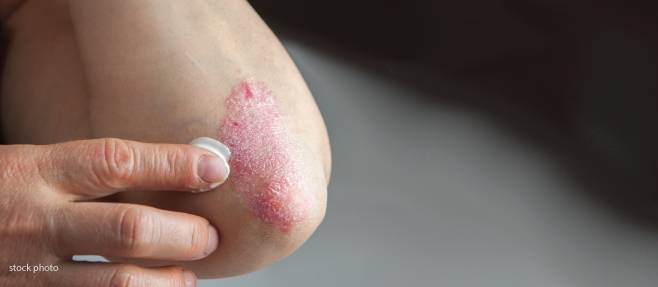
Psoriasis, a common skin condition that is chronic and sometimes painful, is an chronic disease. However, there are things that sufferers can do to minimize psoriasis symptoms.
The following treatment options can minimize symptoms of moderate to severe psoriasis.
Topical Treatments
Topical products are applied directly onto affected areas of the skin to bring local relief. Common active ingredients of topical medications include:
Steroids: Steroid-based topical products are one of the most effective topical options. Steroids can work to relieve itching and inflammation while halting the overproduction of excess skin cells. Steroid topical products can be prescribed in different strengths and formulations (creams, ointments, solutions, foams). The downside of steroids is that they may cause side effects, so always follow instructions provided by your physician.
Retinoids: Prescription strength retinoids contain a synthetic form of vitamin A that can improve psoriasis over time. Retinoids, while not as strong as steroids, can provide good results with less chance of unwanted side effects.
Calcipotriene: Calcipotriene-based topical products, a synthetic vitamin D, can help minimize psoriasis by slowing cellular growth, removing scales, and flattening lesions. Calcipotriene is particularly effective when combined with a topical corticosteroid.
Coal-tar: Coal-tar products (either ointment or shampoo) have been shown to decrease the rapid growth of skin cells on the skin and scalp.
Salicylic Acid: While their efficacy is relatively modest, topical treatments containing salicylic acid can help strip psoriatic scales. This option is ideal in limited cases as using too much can lead to irritation.
Systemic Medications
Systemic medications can be prescribed to treat moderate to severe psoriasis that is unresponsive to other treatments. Medications like acitretin, methotrexate, cyclosporine, or biologics (e.g. Enbrel, Humira, Stelara, Cosentyx, Taltz) work by targeting a portion of the immune system that causes psoriasis. Systemic drugs are administered orally (through liquid or pill form) or injected.
While these oral medications are powerful and effective, they can cause a wide range of side effects. Always follow instructions provided by your physician.
Biologics
Various biologic drugs, commonly referred to as biologics, may be prescribed to treat more severe forms of psoriasis. Biologics are either injected or infused through an IV. Biologics work by blocking the activation of the cells that trigger the development of psoriasis. They target a specific portion of the immune system, which is responsible for both psoriasis and psoriatic arthritis development. Due to the more specific nature compared to other systemic medications, they are effective in treating psoriasis symptoms with limiting potential side effects.
Phototherapy (Light Therapy)
Phototherapy, or light therapy, is an effective psoriasis treatment that works by exposing the skin to ultraviolet light. Overseen by a medical provider, phototherapy utilizes a narrow band ultraviolet B (NB UVB) light source to expose the skin to an exact amount of NB UVB – a level that improves psoriasis, but does not damage the skin. UVB can penetrate the skin to slow the rate of growth of affected skin cells, in turn minimizing psoriasis flare-ups.
Individuals who undergo consistent phototherapy sessions will realize the best results. Phototherapy can also be combined with topical treatments and systemic medication to better control psoriasis.
If you are experiencing psoriasis, contact your dermatologist to find out what treatment options would be best for you.
The post Today’s Best Psoriasis Treatment Options appeared first on Westlake Dermatology®.